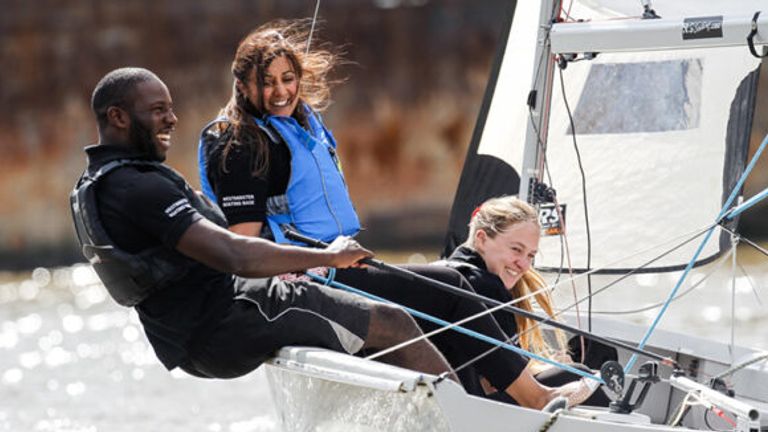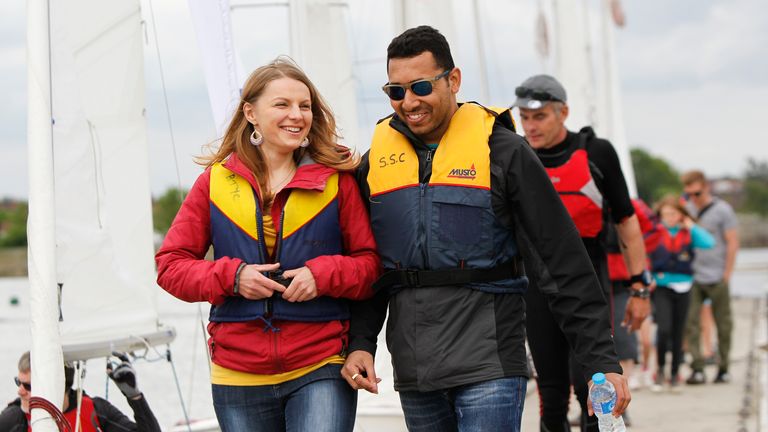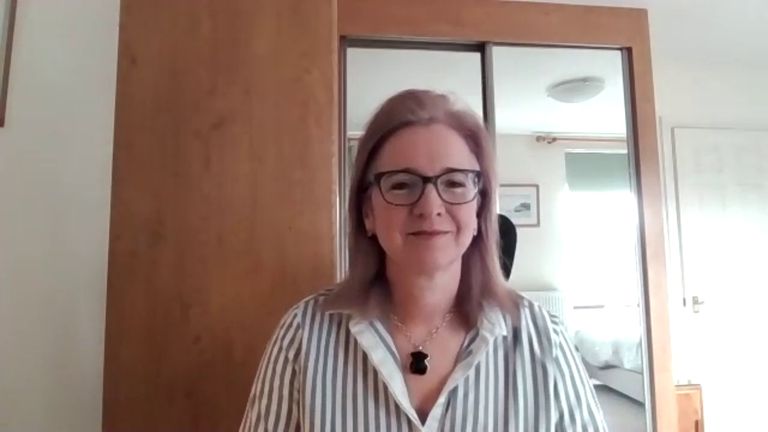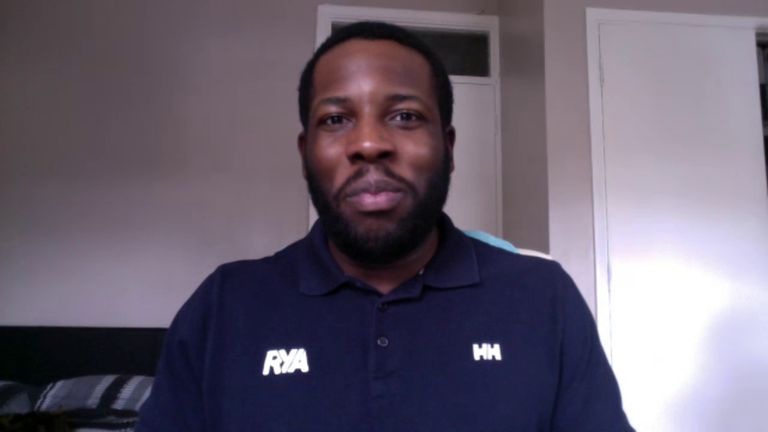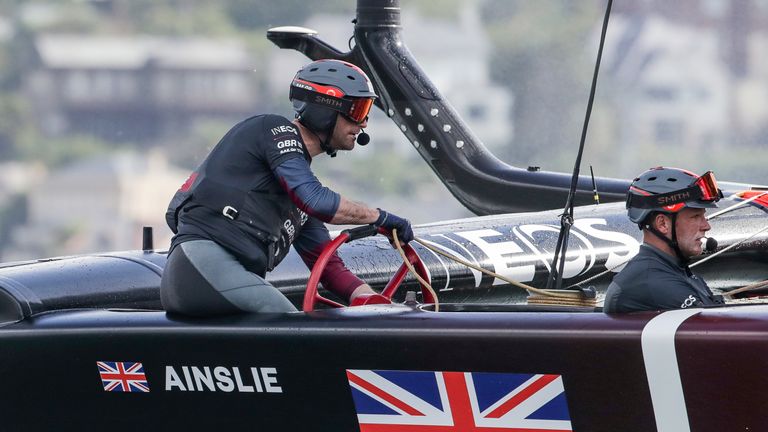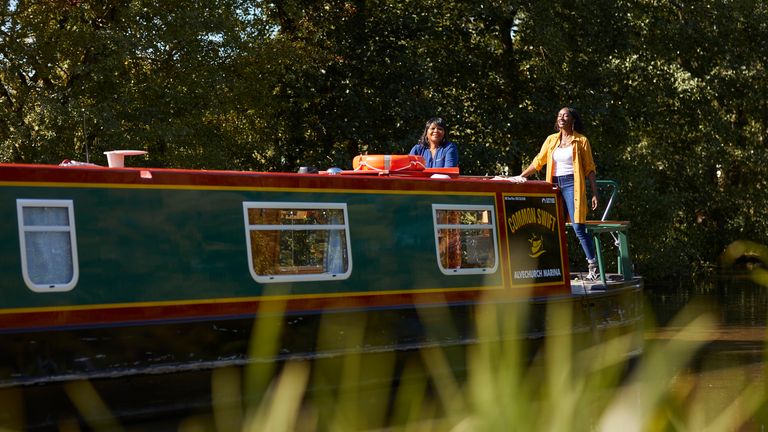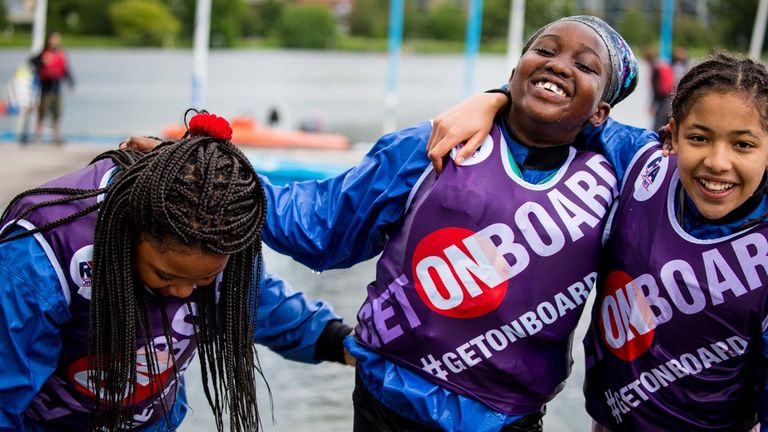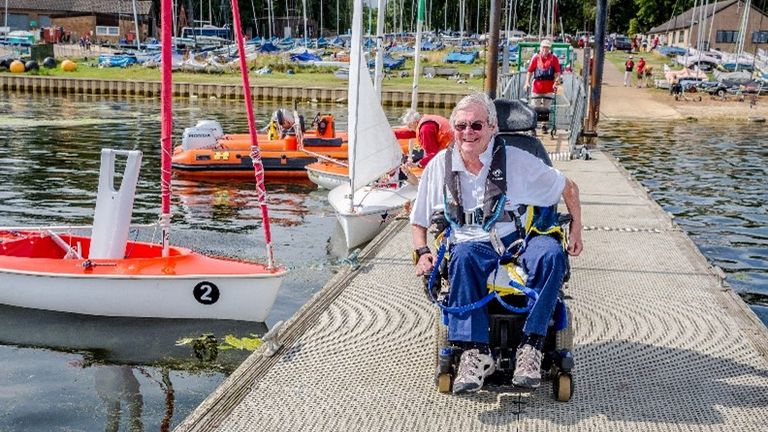Royal Yachting Association sets new diversity strategy amid perception of being too white
Royal Yachting Association is the national body for dinghy, yacht and motor cruising, all forms of sail racing, rigid inflatable boats, and also includes sports boats and windsurfing; almost 97 per cent of the RYA's staff are white; governing body has set out a plan to improve inclusivity
Friday 19 March 2021 17:50, UK
The Royal Yachting Association (RYA) says their new Diversity, Equality and Inclusion Strategy is "ambitious" but admit they still are battling against a perception of boating as being elitist, too white and for middle-class people or millionaires
The new plan outlines "10 steps to progress" - in terms of ethnicity, gender, and LGBTQ+ inclusivity - which will help to "make all forms of recreational boating inclusive, accessible and attractive to all".
Some steps include increasing diversity of staff, including in the boardroom - where there is currently no black or minority ethnic representation - creating new jobs and voluntary opportunities, developing mentoring programmes, providing support and development for clubs and centres and increasing diverse imagery and content.
RYA chief executive Sarah Treseder thinks the new strategy is "very ambitious" and told Sky Sports News the "biggest barrier" is changing the perception of the sport to the general public.
"I think often the perception is that we're all multi-millionaires," she said. "The reality is I've very rarely met a rich sailor.
"We tend to spend all our money on our boats and you can actually pick up a boat for a few hundred quid and really get some enjoyment out of it."
"But also the perception potentially is one where it is more male-dominated. It is older people and potentially that's connected with those individuals who have currently got the time and the energy to dedicate to volunteering at a club level, maybe disproportionately into a retired age bracket or a certain demographic.
"Whereas actually what we're starting to see is at the junior end and at the younger instructor end, there is far more diversity there."
The RYA is the national body for dinghy, yacht and motor cruising, all forms of sail racing, rigid inflatable boats, and also includes sports boats and windsurfing. Improving ethnicity across participants, coaches and staff is a key priority.
Treseder said: "There's a lot of intersectionality, there's a lot of areas where people's ethnicity, people's gender, people's sexual orientation, people's level of disability or otherwise kind of come together. So this is very much a holistic strategy.
"But we were really clear that the area of ethnicity was one where we were least satisfied with the progress that we had been making, where we felt there was most opportunity to change."
Asher Robinson is one of the organisation's few black senior sailing instructors. He says he was fortunate that his mother persuaded him at the age of 11 to get his first experience of boats. Now he wants others to enjoy time on the water.
"I think it's important for sailing to be diverse because it's an amazing sport which I have enjoyed doing," Robinson said, who is also a Sailing Development Officer at the RYA.
"And I feel like there's so many people that are missing out just because of the lack of diversity. So just by having a bit more diversity, it'll be more welcoming and more people will realise what a great sport this is."
Finding the next Sir Ben Ainslie
The RYA say they have over 110,000 personal members - and 1,500 affiliated clubs and class associations - which represent approximately some 350,000 active sailors throughout the UK.
Could the next Sir Ben Ainslie have a diverse background?
Montel Fagan-Jordan won the 2018 Young Sailor of the Year award, which has also been won by four-time Olympic champion Ainslie and double world champion Hannah Mills.
Robinson says seeing a young black sailor being recognised made him very proud.
"A lot of good sailors and amazing sailors that have won that award have gone on to do amazing things in the sailing industry," he said.
"It was just amazing seeing another young black person actually winning such an award. It made me so proud."
Treseder says they already have several diverse stars. She highlights double Paralympic bronze medallist Alexandra Rickham, Montel Fagan-Jordan and Britain's first Paralympic sailing gold medallist Helena Lucas.
She added: "So actually I think there are already a number of very very successful - in multiple ways diverse people - right at the top of the sport.
"What we've maybe not done well enough is profile how well they're doing. And I think that's something we want to change."
One of Robinson's current projects is working with a RYA mentor to promote sailing in primary schools in the London Borough of Newham in east London.
He said: "We're actually going into schools and we are saying, 'look we've got the funding... have some fun and just come and experience sailing'. And what's great about it is they don't pay a single thing."
The idea helped pupils in one school to improve children's academic results and confidence.
"We interviewed them at the end of last year in terms of how they felt after doing it," Robinson added. "And their grades improved not massively, but noticeably.
"And when we asked how they felt, a lot of kids say they felt independent, they felt stronger, they felt more confident. And when you hear things like that, you just can't help but smile."
Getting ethnic diversity in the boardroom
Almost 97 per cent of the RYA's staff are white. In the boardroom 40 per cent are female and 10 per cent identify as LGBTQ+ but there are no black or minority ethnic members.
The new strategy has no quotas or guarantees for incoming board members but Treseder defends that approach.
"I think a lot of people potentially feel that the application of quotas somehow has a negative impact on the people that are then appointed," she said.
"And certainly speaking as a woman in business, I've probably been on the wrong side of that a couple of times. There's some feeling of 'has she really earned the right to have this role or is this somehow just fulfilling a quota?'
"And the other thing is, if we find people with the right experience, why stop at the quota?
"That seems to kind of set a cap on things so I don't think it is about establishing quotas. I think it's about establishing the richest gene pool of people applying that we can."
"However, with ten available seats on the board, the thought that not one of them would be filled by someone from a black, Asian or minority background doesn't make sense."
Treseder also explains why some committees at clubs and training centres are not as diverse as they should be.
"The membership of the committee is often the people who are the most regular participants in any club," she said. "It doesn't tend to be brand new people.
"Often if the diversity strategy is only just starting to communicate to the right audience in the right way, people have just started giving it a go, they would maybe feel nervous or reluctant to sit on a committee when it's a sport that they've only just started. So my sense is that that kind of governance level will filter through from actions to increase participation.
"The interesting bit is what day of the week do we hold the open days on, what food is served? What gender are the instructors who are giving people the opportunity? What are the changing facilities like?
"Where have we advertised the opportunity? What is the public transport access to the club like that will mean more people can turn up?
"And crucially, what's the follow up after people have maybe attended an open day? How do we encourage people to come back and give it another try?"
Ethnicity in Boating Forum
In developing their latest plans, the RYA worked with Emeritus Professor of Equality and Diversity in Sport Kevin Hylton, who works at Leeds Beckett University and is also chair of the Sheffield Race Equality Commission.
He suggested hosting a forum with ethnically diverse members without senior management to encourage open honest conversations about their experiences.
Robinson was one of those who was part of the Ethnicity in Boating Forum with people he had never met like double Paralympic sailing bronze medallist Alexandra Rickham, 2018 Young Sailor of the Year Montel Fagan-Jordan and Poole watersports instructor Lee Timothy.
The RYA leadership and staff left the group alone so they could speak about their experiences with each other in a safe environment. Robinson described it as "absolutely amazing".
"We had a meeting," he said. "There was nobody from the RYA. We spoke about our experiences and then with those experiences, that's where they came up with the action plan [part of the latest strategy].
"I think it's one of the best things I've been a part of in my life. I'm not exaggerating there because all I want is someone who's 11 [years old] just like I was, to be comfortable and know that they're going to be looked after."
Since the initial meeting with Professor Hylton, the Ethnicity in Boating Forum has met RYA management to propose ideas and changes for the newly-released strategy.
'Future success means tearing up diversity plans'
Professor Hylton, who helped guide the new diversity plans, says they are "proactive."
"The RYA has established a high bar in their strategy by aiming to change perceptions, behaviours, experiences, and realities. They are challenging themselves to make their sport more inclusive and are going the right way about it by moving with insight purposely forward," he added.
So how will the RYA chief executive define success?
"I think it's going to be a very long journey," Treseder says.
"I think real success for us is when we're going to be able to tear up that strategy because it's no longer needed. No one feels that it's a requirement that we have it written down on how to increase diversity because it's a reality.
"The benefits are going to be to all of us around the relevance and the vitality of the RYA looking towards the future in particular, and making sure that successive generations are moulding the sport, moulding boating to what works for them, which is going to look quite different to how it was fifty years ago... and how it is today.
"And therefore for clubs to survive and thrive, we need a much more diverse base of participants coming through."
